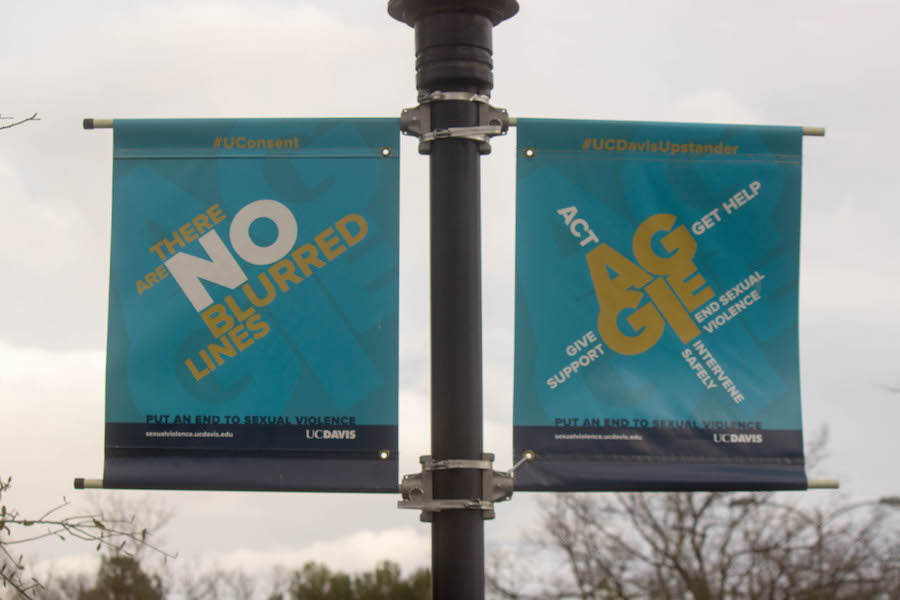
AMCP award recognizes excellence in marketing, communications
The Sexual Violence Awareness and Education (SVAE) Campaign, a project aimed at encouraging students at UC Davis to take an active role in preventing sexual assault, has won a MarCom Award for its achievements in marketing and communications.
The Association of Marketing and Communication Professionals (AMCP), which administers the award, reviewed 6,500 entries throughout the United States, Canada and 17 other countries. The SVAE Campaign received a Platinum Award, the highest award in the competition.
“MarCom Awards recognizes outstanding achievement by creative professionals involved in the concept, direction, design and production of marketing and communication materials and programs,” said Ed Dalheim, the executive director of AMCP, in a press release. “Judges are industry professionals who look for companies and individuals whose talent exceeds a high standard of excellence and whose work serves as a benchmark for the industry.”
Sam Alavi, a fourth-year sociology major and co-chair of the Gender and Sexuality Alliance Network (GSA), attributed that the effectiveness of the campaign was due to its prevalence on campus.
“I think my approach to sexual violence prevention education is that it really has to saturate every aspect of campus,” Alavi said. “So not only in our classrooms or our orientations, and kind of embedded it in our curriculum, but also embedded everywhere else in student life, which was the idea behind the coffee sleeves and the posters and our sexual assault videos, all of those were […] meant to remind students about consent and bystander prevention in all the other moments of their lives at UC Davis, and I think we did a pretty good job of it.”
Andrew McDaniel, a campaign specialist for Student Affairs Marketing and Communications who oversaw the campaign, said that the campaign has effectively helped students have conversations about consent.
“For me personally, working on this campaign is incredibly rewarding,” McDaniel said via email. “These topics can sometimes be uncomfortable for people to talk about, but the campus has reacted very positively to the messages. It’s exciting to help facilitate these necessary conversations.”
The campaign also recently won a Silver Award in the Council for Advancement and Support of Education (CASE) District VII Awards of Excellence. The campaign has also started another segment called “Dear Survivors,” which is a series of photos that aim to support and empower survivors of sexual assault.
“We started the letters to survivors project, which is kind of like a visual forum where people can write letters to themselves or to their loved ones or to survivors in general, and really give them affirmation, and part of my inspiration around was because of Donald Trump, was because of all of these things happening,” Alavi said. “You know it’s kind of emotionally exhausting to talk about this all the time. We don’t really talk about survivors, ever. Even in the beginning of this campaign, it’s very towards preventing sexual violence and not really towards what do we do and how do we support survivors after it happens, and so I think the next part of the campaign for me was making sure they were talking about survivors and how to support them and how to empower them.”
While the campaign released its first set of photos last quarter, its full launch will come in April as part of National Sexual Assault Awareness Month.
“I’m very proud of the work that we have done so far,” McDaniel said. “It’s been amazing to watch so many people across campus come together to support this campaign.”
Regarding the long-term effects of the campaign, Alavi said that students will be able to remember what they learned through the campaign after they graduate, which could help advance sexual assault awareness for generations to come.
“I really strongly believe in the domino effect,” Alavi said. “These students who we are reaching with this campaign are our future teachers and our future police officers and our future doctors and lawyers and judges and presidents. These are the people who, if we teach them now, [will] teach their kids about consent and those people will teach their kids about it, and I think that there’s something really valuable about engaging all 30,000 students here, plus our staff and faculty. If we can actually reach them and teach them, I think that we’re doing a service, not only to our community but to the larger community.”
Written by: Ivan Valenzuela — campus@theaggie.org



